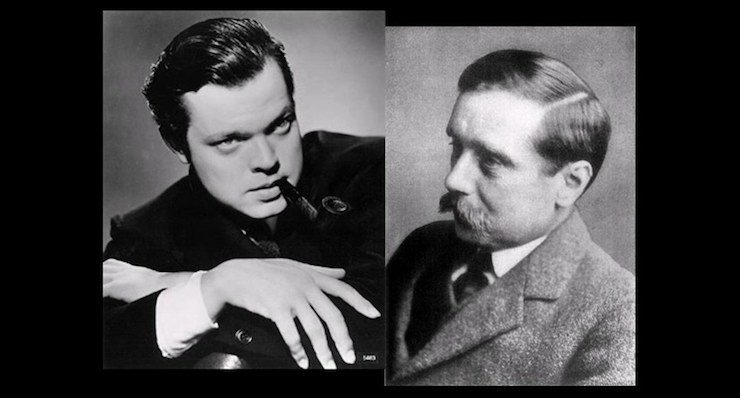If you’re American and a science fiction fan, a radio fan, or a cinephile, you probably know the story about Orson Welles’s radio production of HG Wells’s The War of the Worlds.
But did you know that the two of them got on the radio together to talk about it?
For those not in the know, the 1938 Orson Welles-led radio production of The War of the Worlds—despite several announcements as to the fictional nature of the project while it was on the air—seemed so realistic to the general public that some Americans listening to it went into a panic, thinking that the world was actually being invaded by aliens. To this day, it remains as fascinating case study of media consumption.
But what did author HG Wells think of how his story had been handled? Turns out, he was a big fan. In 1940, both he and Welles got the chance to gab about the incident on the radio together. Wells even goes to the trouble of bringing up Orson Welles’s new film coming up, just some small project that you might have heard tell of—Citizen Kane? He also teases Welles about changing the spelling of his last name so they finally match.
It’s a real treat to hear the two go back and forth, and incredible that this segment has survived for us to access it today.











“For those not in the know, the 1938 Orson Welles-led radio production of The War of the Worlds—despite several announcements as to the fictional nature of the project while it was on the air—seemed so realistic to the general public that many Americans listening to it went into a panic, thinking that the world was actually being invaded by aliens. To this day, it remains as fascinating case study of media consumption.”
No it didn’t. Even the Wikipedia article you linked to debunks it, though only after telling the story of the panic. I expect better from Tor then warmed over urban legends.
@neaden: This is the Internet, sir. When the legend becomes fact, print the legend.
What a wonderful piece of history! I found their discussion of the ongoing war to be very interesting.
@2. rickarddavid
Nothing’s too good for the man who shot Liberty Valance.
@neaden – As you say, the wiki page linked reports nothing close to nation-wide panic, but there were still a great deal of people who did express concern, to the point where the CBS radio studio filled up with cops because they were being ordered to make immediate announcements as to the fictional nature of the program:
Since the word choice seems to be bothersome, “many Americans” has been changed to “some Americans,” but the story itself certainly still stands.
I love how unrehearsed and unpolished the participants sound in this interview. Someone stumbles through a broadcast like that today, even on the radio, it’s called a disaster; then it was perfectly normal to sound perfectly normal.
Note the doom-saying tone. Nothing new is actually new. In fact we can learn a lot about our present times by considering parallels with the 1930s. Just so long as we aren’t going to follow that up with the 1939-1945 period.